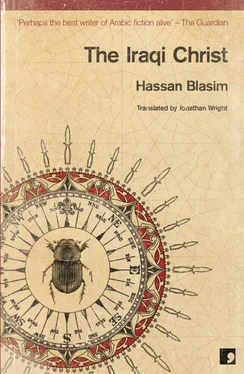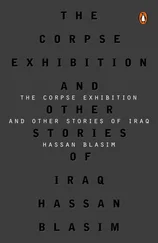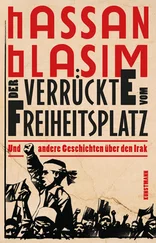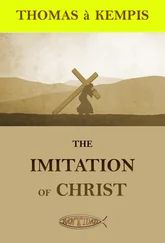It wasn’t easy for a recent graduate like me to find work. The religious groups had opened schools that taught children to memorise the Quran. They offered me work in their schools until I could get a government job, so I got involved in teaching children the Quran and gave up the knife business. From time to time I wrote angry, aggressive and meaningless poems.
Allawi moved out of the capital and wandered around the towns in the south. He toured the markets showing off his skill at making knives disappear, but earned a pittance. Then we heard fresh news about him: he had broken into a restaurant and was arrested for stealing knives from the kitchen. He was sent to prison and we heard no more of him. Souad, friendly and loving, continued to visit Salih the butcher to bring his knives back, and in return Salih would give us the best cuts of meat he had.
One winter’s morning I was at school teaching the children the Iron Chapter of the Quran when the principal came in and told me that a strange young man wanted to talk to me about something important.
He was a tall man in his mid-twenties, and his name was Hassan. He said he wanted to talk to me about Jaafar the referee. I asked the principal for permission to take a break and went to the nearby cafe with the man. We ordered tea and he told me what had happened to Jaafar:
The security forces had set free some hostages from a terrorist hideout and Hassan was one of the people freed. He said he had met Jaafar in the place where they were holding the hostages, a house on a farm on the outskirts of the capital. They had abducted Jaafar because he was trading in pornographic magazines in a wealthy neighbourhood where policemen lived. Hassan said they had brutally tortured him. The terrorists told Jaafar that God had punished him when his legs were amputated during the war but Jaafar hadn’t repented and had gone on selling pictures of obscenities and debauchery. So the terrorists had decided to cut off Jaafar’s arms as a lesson to any unbelieving profligate. The terrorists assembled all the hostages to witness the process of amputating Jaafar’s arms. They couldn’t believe what happened next. Hassan said that whenever the terrorists approached Jaafar, the swords they were holding disappeared and tears were streaming from his eyes. The terrorists didn’t have a single sword or knife left. They were terrified of Jaafar and said he was a devil. They stripped him naked in front of us and crucified him against the wall. They hammered nails into the palms of his hands and he started writhing in pain, naked, with no legs. They decided to amputate his arms with bullets. Two men stood in front of him and sprayed bullets into his arms. One of the bullets hit his heart and he died instantly. They dragged his body to the river, collected some dry branches and poured some petrol on. They set fire to him and chanted ‘God is Most Great.’
Souad and I had a beautiful boy and we called him Jaafar. I continued working in the religious school. I never managed to tell Souad what had happened to her brother. I suppressed the horror that his death caused, and I loved Souad even more. She was my only hope in life. She went back to the Faculty of Medicine and time began to heal the wounds, slowly and cautiously.
Umm Ibtisam came to see us. Her financial situation had greatly improved. She said we were good people and she hadn’t forgotten us. She offered to open a large shop in the neighbourhood for us to sell knives.
Our business was profitable, though sometimes I would unwittingly make one knife or another disappear. At night I would start by kissing Souad’s toes, then creep up to her thighs, then to her navel, her breasts, her armpits and neck until I reached her ear, and then I would whisper, ‘My love, I need help!’
She would pinch me on the bottom, then climb on top of my chest, strangle me with her hands and say: ‘Ha, you wretch, how many knives have you made disappear? I’m not going to get them back until you kiss me a thousand and one times.’
I kissed every pore on her body with passion and reverence as if she were a life that would soon disappear.
When young Jaafar was five years old, his gift emerged: like his mother he could make knives reappear.
Hassan Blasimis a poet, filmmaker and short story writer. Born in Baghdad in 1973, he studied at the city’s Academy of Cinematic Arts, where two of his films Gardenia (screenplay) and White Clay (screenplay & director) won the Academy’s Festival Award for Best Work in their respective years. In 1998 he left Baghdad for Sulaymaniya (Iraqi Kurdistan), where he continued to make films, including the feature-length drama Wounded Camera , under the pseudonym ‘Ouazad Osman’, fearing for his family back in Baghdad under the Hussein dictatorship. In 2004, he moved to Finland, where he has since made numerous short films and documentaries for Finnish television. His stories have previously been published on www.iraqstory.com and his essays on cinema have featured in Cinema Booklets (Emirates Cultural Foundation). After first appearing in English in Madinah , his debut collection The Madman of Freedom Square was translated by Jonathan Wright and published by Comma a year later (2009).
Madman was longlisted for the Independent Foreign Fiction Prize in 2010, and has since been translated into Finnish, Spanish, Polish and Italian. A heavily edited version of the book was finally published in Arabic in 2012, and was immediately banned in Jordan. Hassan has won the English PEN Writers in Translation award twice, and was recently described by The Guardian as ‘perhaps the greatest writer of Arabic fiction alive’. This is his second collection.
Also Available From The Same Author: The Madman of Freedom Squareby Hassan Blasim
Translated from the Arabic by Jonathan Wright
ISBN: 978-1905583256
‘Perhaps the best writer of Arabic fiction alive…’
— The Guardian
From hostage-video makers in Baghdad, to human trafficking in the forests of Serbia, institutionalised paranoia in the Saddam years, to the nightmares of an exile trying to embrace a new life in Amsterdam… Blasim’s stories present an uncompromising view of the West’s relationship with Iraq, spanning over twenty years and taking in everything from the Iran-Iraq War through to the Occupation, as well as offering a haunting critique of the post-war refugee experience.
Blending allegory with historical realism, and subverting readers’ expectations in an unflinching comedy of the macabre, these stories manage to be both phantasmagoric and shockingly real, light in touch yet steeped in personal nightmare. For all their despair and darkness, though, what lingers more than the haunting images of war, or the insanity of those who would benefit from it, is the spirit of defiance, the indefatigable courage of those few characters keeping faith with what remains of human intelligence. Together these stories represent the first major literary work about the war from an Iraqi perspective.
**Longlisted for the 2010 Independent Foreign Fiction Prize**
‘Blasim pitches everyday horror into something almost gothic… his taste for the surreal can be Gogol-like.’ — The Independent
‘Crisp and shocking…. Too febrile and macabre to file under reportage, this cruel, funny and unsettling debut has hooks and twists that will lodge in any mind.’ — The Guardian
‘Blasim moves adeptly between surreal, internalised states of mind and ironic commentary on Islamic extremism and the American invasion… excellent.’ — The Metro
Get The Madman of Freedom Square for Kobo here.












